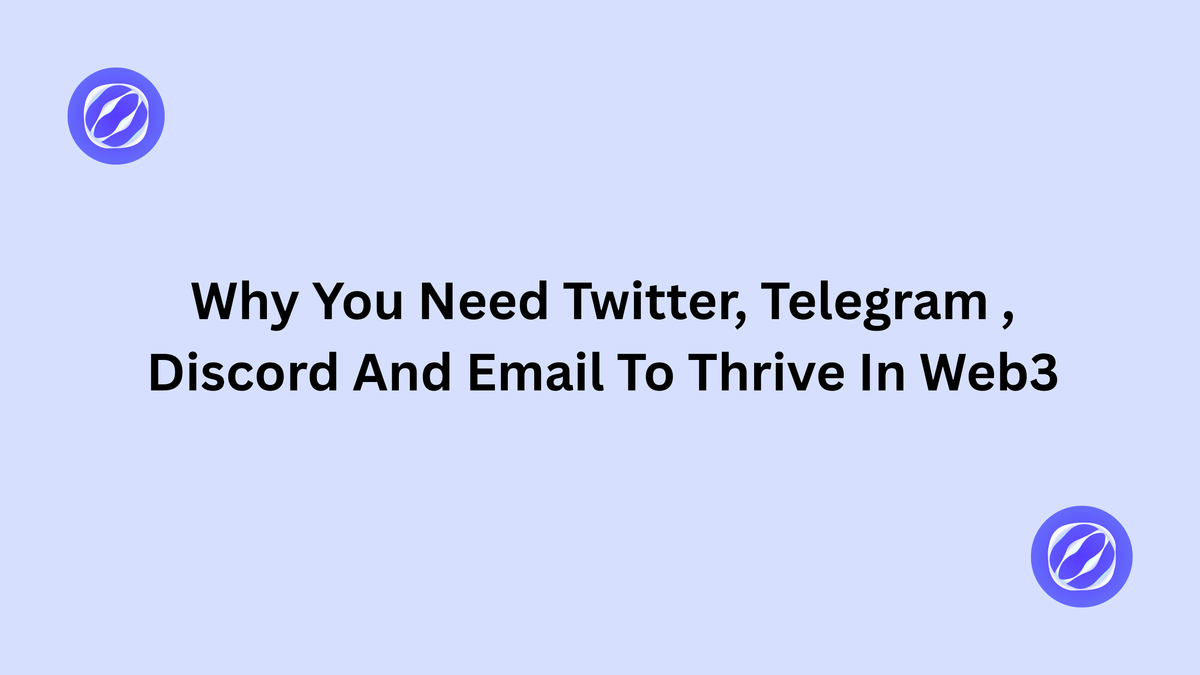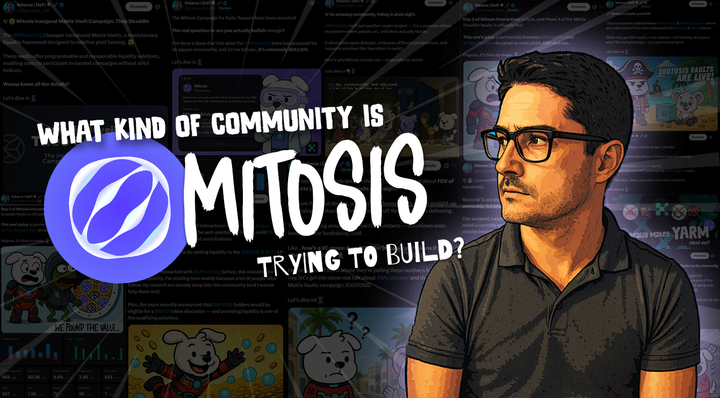Why You Need Twitter, Telegram, Discord and Email to Thrive in Web3

Web3 is not like the traditional web you are used to. It’s decentralized, community-driven, fast-paced, and thrives on constant interaction. In this new frontier, your success as a builder, investor, creator or community member heavily depends on how connected you are to the right information and communities. That’s where four key tools come in: Twitter, Telegram, Discord, and Email. Let’s explore in detail why each of these platforms is non-negotiable for anyone in the Web3 space. 1. Twitter (X): The Real-Time Pulse of Web3 Twitter (X) has evolved into Web3's global town square. It’s where conversations start, news breaks, and ideas go viral instantly. Why It is Crucial: Instant Updates: Project announcements, partnership deals, testnet launches, and airdrops are usually first shared on Twitter. Thought Leadership: Founders, developers, and investors share alpha (insider info) in tweets and threads. Market Sentiment: Twitter helps gauge community mood and project health through comments, likes, and retweets. Spaces & Threads: Twitter Spaces allow live conversations while threads provide in-depth, educational breakdowns. How to Use It Effectively: Follow top accounts in Web3 niches (e.g DeFi, NFTs, DAOs). Use lists to track influencers, dev teams, and alpha accounts. Bookmark threads for deep dives and learning. Be cautious of scams, check verification, never click random links in comments.
2. Telegram: The Fastest Community Link Telegram is a messaging app with both private and public group chat functionalities. It’s used heavily in crypto for direct communication between users and project teams. Why It’s Crucial: Direct Line to Communities: Telegram groups serve as mini-communities where you can ask questions, give feedback, or catch announcements. Airdrops & Whitelists: Many projects announce eligibility or updates via Telegram first. Access to Mods and Devs: Admins and moderators actively answer questions and guide users. High Global Reach: It's widely used in regions where other platforms might be censored.
How to Use It Effectively Only join groups via official links from websites or Twitter. Mute noisy chats, but enable notifications for announcement channels. Avoid engaging with people who DM you directly most are scammers. Use Telegram search to find ecosystem-specific group
3. Discord: The Web3 Collaboration Engine Discord is a voice and text communication platform with structured channels and role-based access. Originally for gamers, it has become the home base for Web3 projects, especially DAOs, NFT collections, and DeFi tools Why Discord? Multi-layered Community Engagement: Channels for general chat, dev updates, support, governance, and events make it a hub for participation. Event Hosting: AMA (Ask Me Anything) sessions, workshops, town halls, and giveaways happen live. Governance and Contributions: Many projects use Discord to organize proposal discussions and assign contributor roles. Access to Rewards: Whitelists, early drops, XP points, and contributor badges are often distributed through Discord. How to Use It Effectively Focus on 3–5 quality servers aligned with your goals (NFTs, DeFi, DAOs, gaming). Introduce yourself and engage; roles are often assigned based on activity. Turn on announcement notifications to avoid missing important info. Be cautious of fake DMs from impersonators; always verify.
4. Email: Your Anchor in a Noisy Space Email remains the most official and secure form of communication in Web3. Despite the fast-paced nature of the industry, email serves a foundational purpose. Why It’s Crucial Formal Communications: Partnerships, onboarding, and confirmations are usually sent via email. Newsletters: Many Web3 thought leaders and DAOs curate weekly digests to keep you informed. Airdrop Eligibility: Projects may email eligible users about token rewards or exclusive invites. Security Alerts: Wallet activity, logins, or new devices are confirmed via email. How to Use It Effectively Create a separate email for Web3 to avoid mixing it with personal or work emails. Subscribe to a few trusted newsletters like Bankless, The Defiant, or project-specific ones. Regularly check your spam/junk folder; Web3 mail often lands there. Be alert for phishing emails; double-check senders and links before clicking. Stay Safe and Smart In The Following Ways. Always confirm official links before joining any group or clicking any button.
Never share private wallet keys or seed phrases.
Use 2FA (two-factor authentication) wherever possible.
Mute or leave toxic/overwhelming channels to focus your energy. In addition, in web3 being early and informed is often more valuable than just being lucky. To succeed, you must be plugged into the right places.
Twitter shows you what’s trending, Telegram gives you rapid updates, Discord connects you deeply with builders and visionaries, and Email keeps your access secure and structured. Think of them not just as apps but as tools for opportunity, learning, contribution, and even financial growth in the Web3 space. If you found this insightful, kindly like, comment and share.
See you in the other side that prints.


Comments ()